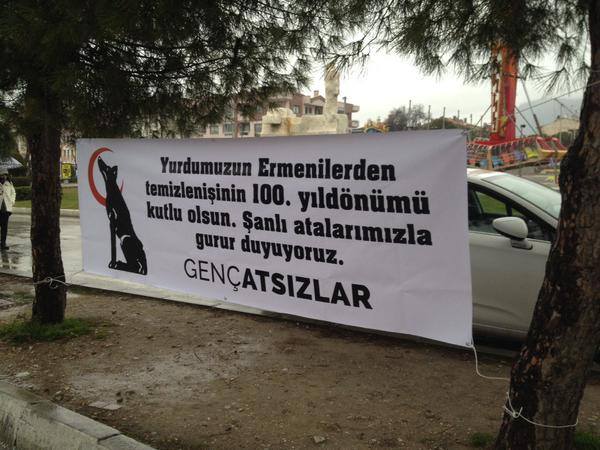A banner in the southwest province of Mugla reads, “We celebrate the 100th anniversary of our country being cleared of Armenians. We are proud of our glorious ancestors. –Young Atsizs.” (Atsizs refers to Nihal Atsiz, a leading ideologue of Turkish racism and a proponent of Turanism).
Banners Celebrating Genocide Displayed in Turkey
Anti-Armenian Protests Held in Istanbul 
Anti-Armenian banners celebrating the Armenian Genocide have been displayed in cities around Turkey. Meanwhile, on Feb. 22, two protests were held under the banner of “Demonstrations Condemning the Khojali Genocide and Armenian Terror,” in the Kadikoy and Beyoglu districts in Istanbul. Some protesters chanted anti-Armenian slogans, while others invoked the name of Ogun Samast, the ultra-nationalist youth who gunned down Agos Editor Hrant Dink in 2007.
The banners celebrating the Armenian Genocide were spotted in different parts of the country. In the southwest province of Mugla, a banner declared, “We celebrate the 100th anniversary of our country being cleared of Armenians. We are proud of our glorious ancestors. –Young Atsizs.” Atsizs refers to Nihal Atsiz (1905-75), a leading ideologue of Turkish racism and a proponent of Turanism. The banner was displayed in front of the Provincial Directorate of Youth and Sports in Mugla. The Directorate claimed the banner was hung far enough that they had not seen it, but that “responsible citizens” had removed it, according to
Demokrat Haber.
Similar banners were also displayed in Manisa (north of Izmir), and Ordu (on the Black Sea coast). Demokrat Haber also reports that similar posters were put up by the Mayor’s office in Sogutlucesme, Istanbul, as well as Marmara University’s Goztepe campus.
“The Human Rights Association can only attempt to raise a voice protesting these initiatives. As long as the Turkish public is not upset, and feels no shame by these demonstrations, the discourse, and the slogans, there will be no real response to these rabid anti-Armenian initiatives,” human rights activist Ayse Gunaysu told the
Armenian Weekly, adding, “This reality has been haunting me in recent days.”
Protests around Istanbul
In Kadikoy, an anonymous source observed around 1,000-1,500 protesters, many waving Azerbaijani flags. The source said aside from nationalist slogans, and chants about the “Khojali genocide,” anti-Kurdish slogans were also heard, presumably fueled by the recent killing of an ultranationalist man who was partaking in an attack against members of the pro-Kurdish People’s Democratic Party (HDP) in Izmir. The anti-Armenian slogans were more muted than what had been observed during the Feb. 26, 2012 anti-Armenian protest, noted the source.
According to Gunaysu, a Weekly contributor, protesters might have been deterred from chanting rabidly anti-Armenian slogans during the latest rally due to the fact that those who had carried banners reading, “You are all Armenians, you are all bastards,” in 2012, had been sentenced to 5 months in prison, which was later turned to a 3,000 TL fine by the court.
The police were present in large numbers in Kadikoy, and blocked movement to main streets, including near the offices of the pro-Kurdish People’s Democratic Party (HDP).
According to Demokrat Haber, buses transported protesters—free of charge—from in front of the governorates of surrounding cities to where the Kadikoy demonstration was being held.
In the days leading up to the protest, the Human Rights Association (HRA) of Turkey’s Istanbul branch issued a statement condemning the protest, calling it a “pretext to incite ethnic hate against Armenians in Turkey.”
The organization also petitioned the Istanbul Governorate, warning officials of the anti-Armenian sentiments that were on the rise ahead of the planned protest.
According to Demokrat Haber, despite the fact that the protest organizers had claimed to have the proper permits to stage the rally, the Istanbul Governorate had not been notified about the demonstration, and had not received any permit applications. Furthermore, official sources held that in keeping in line with clause 6 of the “Law on Rallies and Demonstration Marches,” permits could not have been granted for the location of the rally, since the area is off limits as a public gathering space.
Similarly, the HRA received a fax from the Governorate of Istanbul, stating that their office neither received a request for permission for the protests, nor granted any such permission.
Meanwhile, according to a source, the Association of Reformist Youth of Azerbaijan has denied involvement in these protests. Earlier the HRA had reported that the protests were being organized by the Association of Reformist Youth of Azerbaijan, together with the Turkish Hearths Youth branches and the Turanist Movement Platform.
In Galatasaray Square in Beyoglu, a smaller protest was held with participants from the Nationalist Turkey Party and the Turan Hearths. According to the Turkish news outlet Haberler, the protesters shouted slogans against Armenia; calling Khojali a “part of the homeland” that was “under Armenian invasion.” The protesters also condemned the international community for supporting Armenia. Minor clashes with the police were reported.
The Feb. 20 HRA statement cautioned that anti-Armenian sentiments were on the rise, and that racist graffiti had been spray painted on and near churches, with messages such as, “You are all Armenians, you are all bastards.”
The HRA statement added, “You, officials who refrain from criminalizing racist slogans on church walls, who officially or unofficially permit protests and demonstrations pre announced by such slogans, if you do not enforce the law, you will become partners in the crime…”




